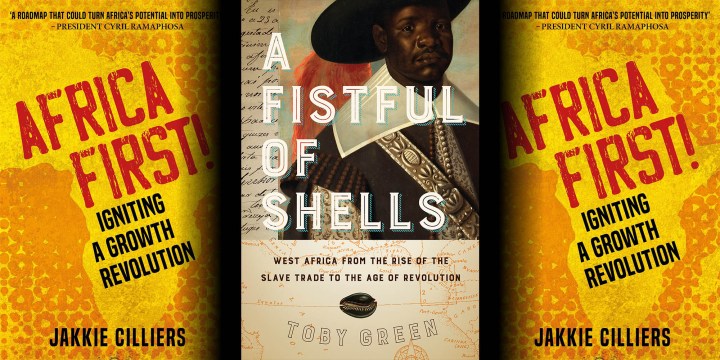BUSINESS MAVERICK REVIEW
Two recent books provide rich insight into Africa’s past, present and future

Toby Green reclaims West Africa’s place in this history: The peoples of the region overthrew aristocracies that had emerged to prey on them. This is another warning perhaps to the 21st century autocratic states, often underpinned by oil or other commodity revenue flows, that Jakkie Cilliers examines.
In Africa First! Igniting a Growth Revolution, Jakkie Cilliers makes the convincing case that Africa’s current low-growth trajectory need not define its future. In A Fistful of Shells: West Africa from the rise of the Slave Trade to the Age of Revolution, published in 2019, historian Toby Green unearths some of the roots of Africa’s current problems, while restoring the continent’s rightful place in global economic history. This reviewer found both books stimulating, especially when read one after the other, with the insights of one feeding off the other.
Green, a historian at King’s College London, connects pre-colonial West and Central African history to wider global trends as a robust rebuttal to the notion that “Africa has no history”, or had an economic history rooted in barter – notions which still have surprising currency.
Speaking of currency, Green anchors much of this superb study in patterns of trade and foreign exchange between West Africa and the wider Atlantic economy. “For several centuries, Western African societies exported what might be called ‘hard currencies’, especially gold; these were currencies that, on a global scale, retained their value over time. For the first two centuries of Atlantic (slave) trade, these societies also imported large amounts of goods that were used as currencies: cowries, copper, cloth and iron. However, these were what we might call ‘soft currencies’, which were losing their relative value over time. By 1700, therefore, centuries of trade had been grounded in inequalities of the exchange of economic value …”
In the 21st century, Cilliers, a futurist and analyst who founded the Institute for Security Studies, also sees worsening terms of trade scenarios unfolding, not least because of Africa’s growing dependence on commodities. He also notes the profound impact that slavery has had on the continent’s history.
Among other things, this would lead to what economists might today call a “terms of trade shock”, which weakened West African states and economies ahead of the late 19th-century colonisation scramble. The collapse of the value of its currency helped to undermine the Kongo Kingdom – a stark warning for some of the trends that Cilliers explores in the 21st century.
The net cast by Green’s book is wide. Who knew that West African demand for iron ore helped to facilitate early industrialisation in Europe? Then there is the “Age of Revolution” of the book’s title, the age that historians generally attribute to the American, French and Haitian Revolutions and Britains Industrial Revolution.
Green reclaims West Africa’s place in this history: The peoples of the region overthrew aristocracies that had emerged to prey on them, including literally in the case of enslavement. This is another warning perhaps to the 21st century autocratic states, often underpinned by oil or other commodity revenue flows, that Cilliers examines.
Slavery and the slave trade, of course, had a profound and lasting impact on the region. Green explores how this even extended into agricultural production, which was increased to feed enslaved persons on the Atlantic crossing. This sucked potential surplus value out of the West African economy to feed humans who, in turn, would produce surplus value on New World plantations. But this surplus was lost and could not be reinvested, adding to the woes of a region beset by declining currency values and worsening terms of trade.
In the 21st century, Cilliers, a futurist and analyst who founded the Institute for Security Studies, also sees worsening terms of trade scenarios unfolding, not least because of Africa’s growing dependence on commodities. He also notes the profound impact that slavery has had on the continent’s history.
“Effectively,” he writes, “Africa was forced to export more and more commodities that became worth less and less as the terms of trade (the ratio of export prices to import prices) steadily declined over the long term.”
Cilliers breaks his book down into readable chapters that look at various development constraints which have kept Africa poor, with relatively low levels of economic growth. These constraints include demographics, health, education, agriculture, trade and other factors. Cilliers looks at current forecasts on these fronts and suggests sensible reforms that could make these forecasts far less gloomy. Not everyone will agree with his prognosis, but his roadmap is at least one of hope.
Taken together, these two books provide invaluable insights into Africa’s history while suggesting ways for the continent to escape the poverty that has defined it. DM/BM



















 Become an Insider
Become an Insider